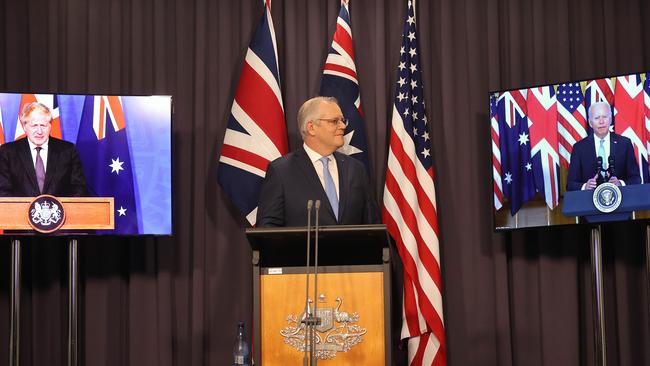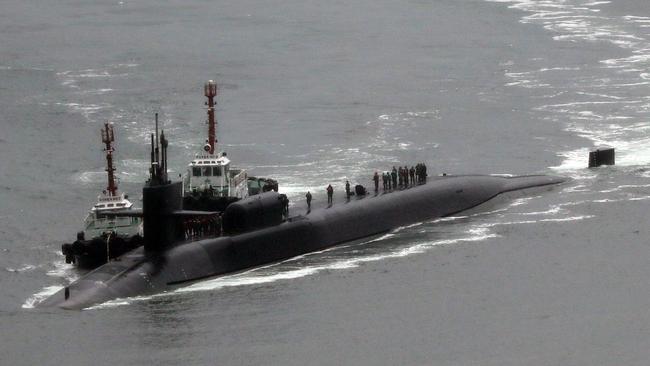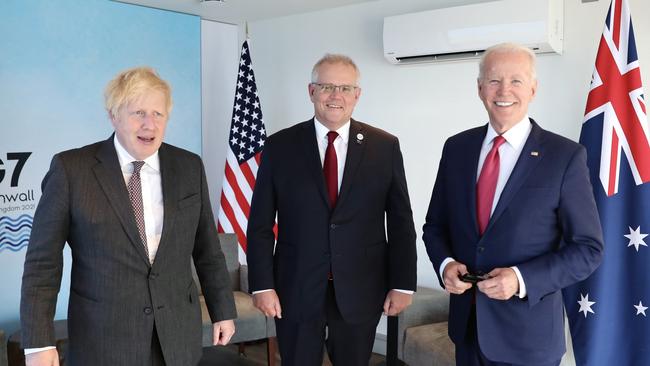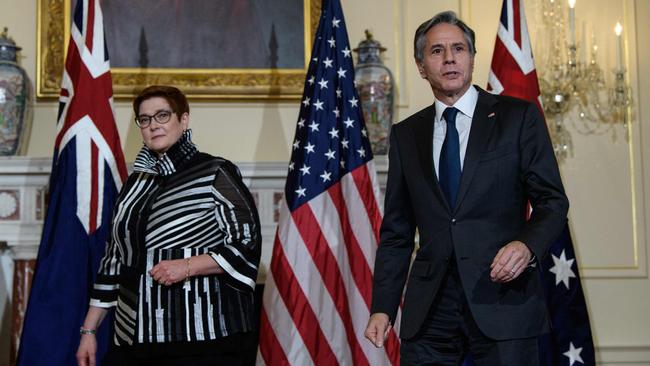LIVE
'Irresponsible': China blasts nuclear subs deal in Australia, UK, US 'forever partnership'
Beijing reacts with fury after Australia acquires at least eight nuclear-powered submarines in a deal with the US and UK.

Beijing has slammed a new US alliance with Australia and Britain, under which Canberra will acquire nuclear submarine technology, as an “extremely irresponsible” threat to regional stability.
The agreement “seriously undermines regional peace and stability and intensifies the arms race”, Chinese foreign ministry spokesman Zhao Lijian told a regular press briefing.
Australia’s Prime Minister Scott Morrison has extended an “open invitation” for talks with Chinese President Xi Jinping, after announcing a series of high-tech military purchases spurred by Beijing’s growing strength.
Mr Morrison said he remains ready to hold discussions with President Xi, despite high-level talks being frozen and growing tensions between the two countries.
“There’s an open invitation for President Xi to discuss other matters,” Morrison said, after announcing the acquisition of at least eight US nuclear-powered submarines and cruise missiles in a once-in-a-generation decision that will deliver the nation unprecedented strike capability and require a significant boost to Defence spending.
The new nuclear boats will be delivered under a historic Defence technology partnership between Australia, the United States and the United Kingdom - called AUKUS - to meet rising Chinese strategic threats.
The submarines will cost more than the estimated $90 billion price tag for the now-cancelled French-designed Attack-class submarines.
Mr Morrison said the decision was made because there was “no pathway” to a nuclear-powered boat when the French submarines were ordered in 2016, and strategic circumstances had significantly worsened in the five years since.
Reactor technology has also changed, enabling Australia to operate nuclear-powered boats without having to service their sealed reactors over the submarine’s lifetime.
The new fleet will be built in Adelaide and the PM provided an assurance Australia was “not seeking to establish nuclear weapons or establish a civil nuclear capability.”
“We will continue to meet all of our nuclear non-proliferation obligations,” he said.
Australia will become the first nation without a domestic nuclear industry to obtain nuclear-powered submarines, which are stealthier, faster and more manoeuvrable. They have a virtually unlimited range, and can stay submerged far longer.
Mr Morrison first raised the prospect of Australia gaining access to US nuclear submarine technology with US President Joe Biden this year, after an extensive process within Defence to decide “is this feasible?”, and official-level talks with both the US and UK.
The deal was sealed at a trilateral meeting between Mr Morrison, Mr Biden and UK Prime Minister Boris Johnson on the sidelines of the G7-plus meeting in Cornwall in June.
Mr Johnson said the AUKUS submarine project would be "one of the most complex and technically demanding projects in the world” and would last decades.
“We will be joined even more closely together, reflecting the depth of our friendship and enduring strength of shared values of freedom and democracy,” he added.
Australia will also gain access to US missile technology under the deal, accelerating plans for a domestic guided weapons industry, while a range of US-made missiles will also be obtained including Tomahawk cruise missiles for Australia’s Hobart-class destroyers.
The PM told a furious French President Emmanuel Macron of the decision on Wednesday night. “To say he was disappointed was an understatement,” senior government sources said.
In a joint statement on Thursday, French Foreign Minister and French Defence Minister Florence Parly said scrapping the $90 billion subs deal with French submarine company Naval Group was "contrary to the spirit and the letter" of co-operation between Canberra and Paris.
However, the Morrison government hopes to repair Australia’s relationship with the key Indo-Pacific partner as it did with Japan after the 2016 decision not to proceed with Japanese subs.
Mr Morrison also spoke on Wednesday night to New Zealand Prime Minister Jacinda Ardern - who Australia hopes will smooth over any concerns among Pacific nations - as well as Japanese Prime Minister Yoshihide Suga and Indian Prime Minister Narendra Modi. Indonesia was informed through its Defence Minister Prabowo Subianto.
Australia had sunk $2.4 billion into the Attack-class program, and will have to pay further costs estimated in the “hundreds of millions”.

The Pentagon said the US would help Australia “identify pathways” to build, obtain or buy nuclear submarines.
Appearing virtually in a press statement alongside Mr Biden and Mr Johnson, Mr Morrison said he was pleased to join with “two great friends of freedom.”
“Today we join our nations in a next generation partnership built on a strong foundation of proven trust,” Mr Morrison said.
“We have always seen the world through a similar lens. We have always believed in a world that favours freedom, that respects human dignity – the rule of law, the independence of sovereign states and the peaceful fellowship of nations.”
Government sources said the final decision could be a combination of the two submarines, but the preference was to secure a submarine design with as few modifications as possible to speed the construction phase.
Construction on the first of the submarines is due to commence in Adelaide late this decade, and be completed in the second half of the 2030s.
The delivery of the first boat is expected to be several years after what had been the scheduled 2033 delivery date for the first of the Attack-class boats.
Former US Ambassador Joe Hockey said the AUKUS agreement was “ANZUS 2.0”, a “real and tangible statement about the growing depth in the relationship between Australia, the US and UK” that would “reverberate around the world”.
“The US spends more on technology than the next 12 countries combined and Australia; this locks in Australia as a privileged supplier, not just on defence but intelligence and obviously space too,” he added.

Defence Minister Peter Dutton arrived at the Pentagon on Wednesday morning EDT, greeted by Defence Secretary Lloyd Austin accompanied by a full military band, for the start of the 31st annual Australia-US ministerial bilateral talks. Foreign minister Marise Payne, also part of the annual talks, separately met her counterpart Antony Blinken at the State department.
Mr Dutton said “the situation in the Indo-Pacific was deteriorating” and the 20 year anniversary of 9/11 terrorist attacks was a “reminder of the need to continue our relationship and stare down evil and deal with whatever this century might hold”.
The Defence Minister also thanked the US for holding Kabul airport so Australia could withdraw 4,100 people. “Despite the criticism and those with 20/20 hindsight we achieved success in withdrawing those people,” Mr Dutton said.
Lloyd Austin said “the alignment (between Australia and the US) has never been greater than it is today, we see the same challenges and see the same sense of urgency”. A former four-star general overseeing US operations in the Middle East, the Defence Secretary said he expected the discussions to “further strength our alliance in new and unique ways”.

Richard Fontaine, the director of the Centre for New American Security, told The Australian the power balance in the region had been “shifting in China’s direction for years, and it’s submarine fleet is one of the reasons why”.
“It’s been seventy years since the US has been willing to share this technology, and it has said no to a number of interested countries,” he added.
Evan Medeiros, an expert on US-China relations at Georgetown University, said the agreement would confirm China’s perception that “a strategic decision was made by the US to comprehensive strategic competition with China by forming what the Chinese call security gangs or coalitions of countries to balance Chinese power”.
“This agreement is huge, historic, not just because of the transpacific nature but because of British involvement,” he said, noting the “Anglo-Saxon” dimension to the new arrangement. “In fact the UK dimension is perhaps most surprising. It ties them into our net in Asia. But this puts the UK out on a limb with China,” he added. “China might target them next. I hope London is ready for what’s coming”.
Australia, without a domestic nuclear infrastructure, told the US it was “dedicated to go in this direction even if it takes a couple years”, a move that could fracture the Labor party, whose leadership was briefed ahead of the announcement.
Labor and the Greens strongly support the Environment Protection and Biodiversity Conservation Act 1999, which outlawed nuclear power in Australia, even though the nation exports around $750m worth of uranium a year.
The new tripartite agreement also signals a new senior tier in the “five eyes” security arrangement between the US, UK, Australia, Canada and New Zealand, which emerged informally in the early 1940s during the second world war.
“This is the real bite associated with Five Eyes, it is real teeth,” Mr Hockey said.
Professor Medeiros said New Zealand’s “growing accommodation to China” was “just sad.”
“It didn’t have to happen this way; something will happen and they will get thrown out of the car and kicked to the kerb, and we’ll all be sad because it’s just a nice country,” he added.
The US revoked its obligations to New Zealand under the treaty in 1986, after the New Zealand government withdrew access rights for nuclear-powered US warships, a policy it phased out in 2012.
Brazil and South Korea have also planned to build or acquire nuclear-powered submarines.
More Coverage
Join the conversation




To join the conversation, please log in. Don't have an account? Register
Join the conversation, you are commenting as Logout